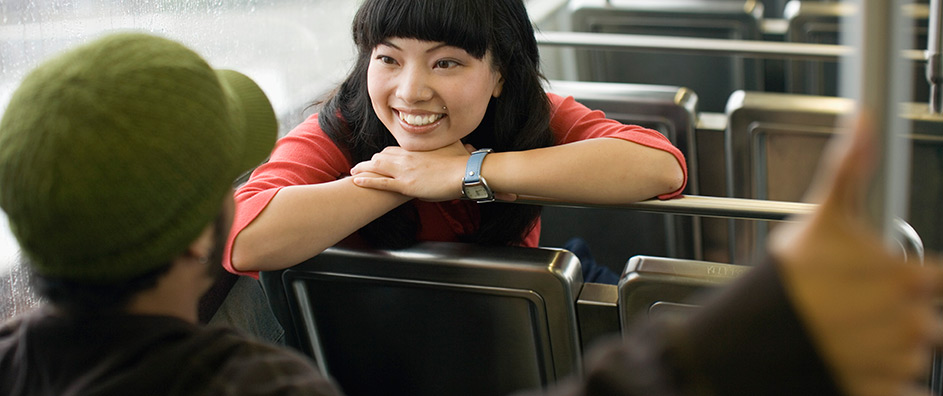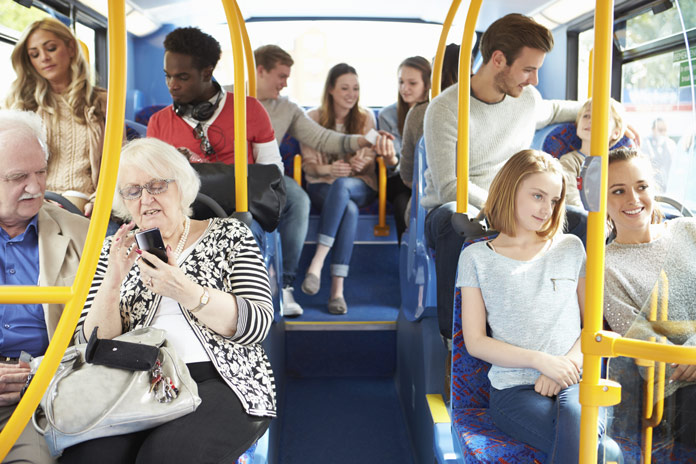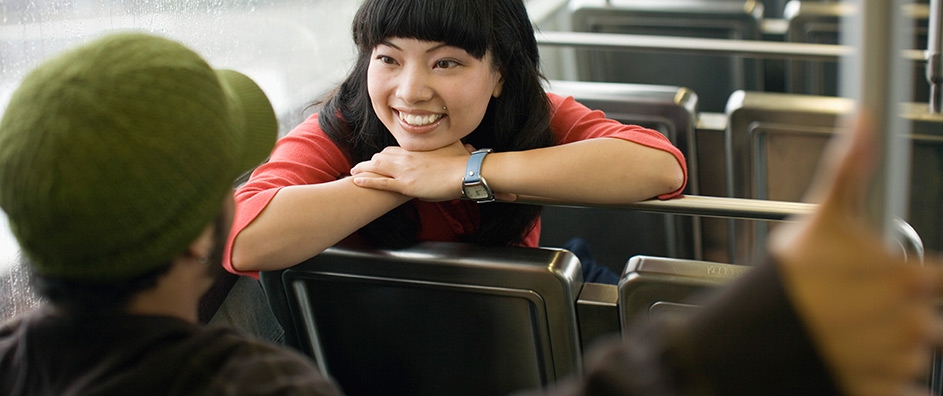The views expressed in our content reflect individual perspectives and do not represent the authoritative views of the Baha'i Faith.
 I don’t know if other people have seen this, too, but it’s definitely true in my own experience: riding public transit can foster a sense of common humanity among fellow travelers.
I don’t know if other people have seen this, too, but it’s definitely true in my own experience: riding public transit can foster a sense of common humanity among fellow travelers.
Now I know what you’re thinking; “Every time I get on the bus, nobody talks to each other or makes eye contact. It’s like they’re on separate planets.” That can be true in some places. Often, it feels like an unwritten rule forbids chatting up strangers on buses and trains. But that’s a far cry, researchers tell us, from how people interact with each other when they’re in their own car and know that no one else can hear what they’re saying.
Dr. Leon James a researcher on the psychology of road rage, has this to say,
I was astounded the first time I listened to drivers who had tape recorded their thoughts and feelings in traffic, speaking their thoughts aloud while driving, giving a sort of play-by-play of what it’s like inside the private world of the driver…. One feature that particularly amazed me was the pervasive negativity of their thoughts and feelings. In a kind of Jekyll and Hyde effect perfectly ordinary, friendly, good-hearted people tend to become extremely intolerant and anti-social as soon as they get behind the wheel. Behind the wheel their personality undergoes a rapid transformation, from polite and tolerant to inconsiderate, intolerant and emotionally unintelligent.
This isn’t just about the people. Instead, the environment around us and the things in it have been designed with an individualistic way of life in mind. Unless we become aware of that and actively go against its grain, we can get sucked into that aggressive culture and mindset of thinking and acting too. Dr. James continues:
It took several years of research for me to understand the psychological mechanism of emotionally impaired driving. The car is not only an object of convenience, beauty, and status. It is also a cultural and psychological object, associated with the driver’s internal mental and emotional dynamics, our ego. Cars are an extension of the self, they are ego-laden objects that can be used both positively and negatively to get our own way on the road. The automobile offers us a means to exercise direct control over our environment. When we enter the car we use it as an outlet for regaining a sense of control. Automobiles are powerful, and obedient. They respond instantly and gratifyingly to our command, giving us a sense of well being that comes with achieving control over one’s environment.
 In my experience, taking public transit can make a huge difference. It may not be warm and amiable. But even when it gets crowded, there’s still an atmosphere of mutual respect and a feeling that we’re all in this together. If somebody drops something or is having difficulty getting on or off, strangers will volunteer a helping hand. When space is limited, riders will find ways to take up less space. Seeing and being near a person activates our sense of compassion and empathy, especially if we can see his or her face. These are all my own impressions, not science. But I think many people out there would agree with me.
In my experience, taking public transit can make a huge difference. It may not be warm and amiable. But even when it gets crowded, there’s still an atmosphere of mutual respect and a feeling that we’re all in this together. If somebody drops something or is having difficulty getting on or off, strangers will volunteer a helping hand. When space is limited, riders will find ways to take up less space. Seeing and being near a person activates our sense of compassion and empathy, especially if we can see his or her face. These are all my own impressions, not science. But I think many people out there would agree with me.
Every society combines a public realm open to all, and the private realms of its members. One of the distinguishing features of modern consumerist societies, the private realm doesn’t just end at the front door of our homes. We take it with us, like a protective bubble, wherever we go. Cars, earbuds, smartphones, and any number of other products allow people to tune out the existence of others. Isolation, perversely enough, is almost treated as a social good. But times are changing. (For more on the subject be sure to read How You Can Become a Commoner) Sharing spaces, things, and experiences in common has begun to emerge as a hope-inspiring path to a better world. People are waking up to the idea that other people are a joy to be discovered, not burdens to be endured. In this light, I think we can gain so much from Baha’u’llah’s teachings on friendliness and unity:
They that are endued with sincerity and faithfulness should associate with all the peoples and kindreds of the earth with joy and radiance, inasmuch as consorting with people hath promoted and will continue to promote unity and concord, which in turn are conducive to the maintenance of order in the world and to the regeneration of nations. Blessed are such as hold fast to the cord of kindliness and tender mercy and are free from animosity and hatred. – Tablets of Baha’u’llah, p. 35
However we get there, we can take those words with us on the road.
















Comments
Sign in or create an account
Continue with Googleor